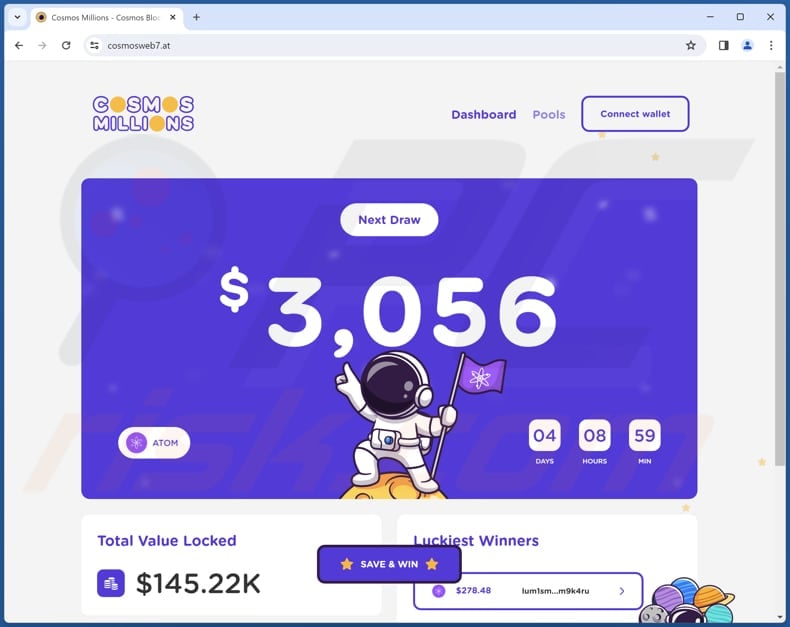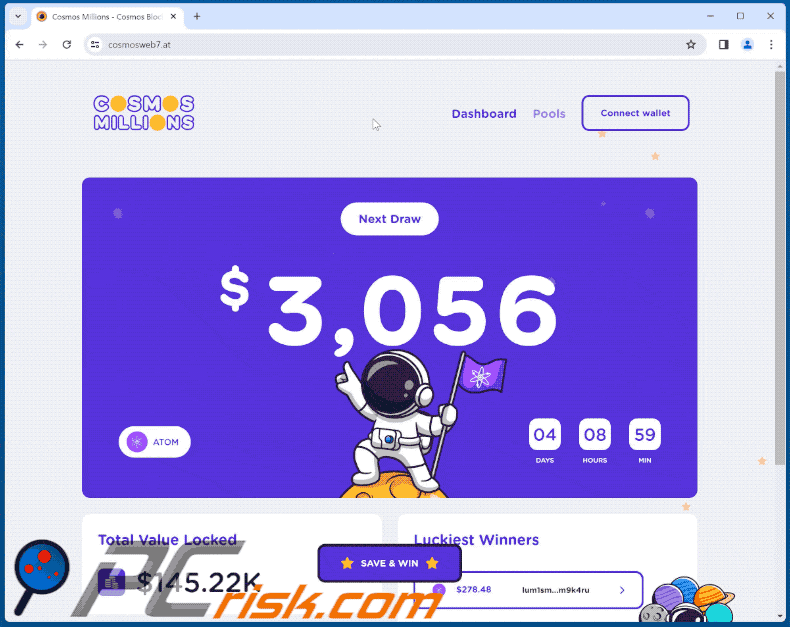How to avoid falling for scams like "Cosmos Million"
Phishing/ScamAlso Known As: Cosmos Million crypto scam
Get free scan and check if your device is infected.
Remove it nowTo use full-featured product, you have to purchase a license for Combo Cleaner. Seven days free trial available. Combo Cleaner is owned and operated by RCS LT, the parent company of PCRisk.com.
What is "Cosmos Million"?
During our analysis of the scam, we found that "Cosmos Millions" entices users with promises of winning big through prize-linked savings accounts. However, upon closer examination, it becomes evident that the scheme operates by stealing cryptocurrency from users without providing genuine prize winnings, ultimately leading to financial losses for participants.

"Cosmos Million" in detail
This scam preys on individuals by enticing them with promises of winning big while saving smart. The scam promotes itself as a DeFi protocol and open-source platform for prize savings, claiming to offer a thrilling utility for assets through prize-linked savings accounts.
Victims are encouraged to deposit their assets into the protocol, with the promise of automatically being entered into regular, randomized draws for community-contributed prizes. However, the reality is that the scheme is designed to deceive users into believing they have a chance to win significant prizes when, in fact, the chances of winning are none.
While participants may believe they are eligible for prizes, the draws are non-existent. The "Cosmos Millions" scam operates with the intention of deceiving individuals into engaging with a malicious contract by "connecting" their wallets to the platform. Once the victim signs the contract, a cryptocurrency drainer is activated.
This drainer is specifically designed to surreptitiously siphon cryptocurrency from the victim's wallet, funneling it directly into the scammer's wallet without the victim's knowledge or consent. Essentially, the scam exploits the trust of users to gain access to their cryptocurrency assets, resulting in significant financial losses for the unsuspecting victims.
| Name | Cosmos Million crypto scam |
| Threat Type | Phishing, Scam, Social Engineering, Fraud |
| Fake Claim | Participants can win cryptocurrency |
| Related Domain | cosmosweb7[.]at |
| Detection Names | N/A (VirusTotal) |
| Symptoms | Lack of official verification, unrealistic claims, too good-to-be-true promises. |
| Distribution methods | Social media (including stolen Twitter accounts), compromised websites, rogue online pop-up ads, potentially unwanted applications. |
| Damage | Loss of sensitive private information, monetary loss, identity theft, possible malware infections. |
| Malware Removal (Windows) |
To eliminate possible malware infections, scan your computer with legitimate antivirus software. Our security researchers recommend using Combo Cleaner. Download Combo CleanerTo use full-featured product, you have to purchase a license for Combo Cleaner. 7 days free trial available. Combo Cleaner is owned and operated by RCS LT, the parent company of PCRisk.com. |
Similar scams in general
These scams typically include enticing promises of significant financial gains with minimal effort. They often require users to connect their wallets or provide personal information, allowing scammers to gain access to their funds or sensitive data.
Additionally, these scams rely on psychological manipulation tactics, such as creating a sense of urgency or fear of missing out, to prompt users to take immediate action without fully understanding the risks involved. Ultimately, the common goal of these scams is to exploit users' trust and greed, leading to financial losses or compromised security.
More examples of fraudulent schemes involving crypto drainers are "CREO ENGINE Launchpad", "MAGA Airdrop", and "MTGOX Online Rehabilitation Claim System".
How did I open a scam website?
Scammers employ diverse strategies to ensnare unsuspecting victims, including hijacking verified X (formerly Twitter) accounts of celebrities or reputable businesses to redirect users to their fraudulent platforms. They can also use adware to propagate scams aimed at activating crypto drainers.
Moreover, individuals may stumble upon scam pages via deceptive advertisements, pop-ups, notifications from untrustworthy sources, and websites employing rogue advertising networks (e.g., torrent sites). Furthermore, scammers register deceptive domain names resembling those of legitimate projects to deceive unsuspecting users.
How to avoid visiting scam pages?
Remain cautious when opening links in suspicious emails, particularly those that seem irrelevant or unexpected, and especially if they pressure you to take immediate action or contain dubious content. Always double-check website legitimacy by verifying URLs to ensure they correspond to the official domains of trusted entities.
Exercise discretion when confronted with online advertisements and pop-ups, resisting the temptation to click on enticing offers. Avoid granting permission to receive notifications from dubious websites. Utilize reputable antivirus software and ensure your systems and programs are regularly updated.
Stay informed about prevalent online scams and phishing techniques to bolster your defenses against potential threats. If your computer is already infected with unwanted apps, we recommend running a scan with Combo Cleaner Antivirus for Windows to automatically eliminate them.
The appearance of "Cosmos Million" pop-up scam (GIF):

Instant automatic malware removal:
Manual threat removal might be a lengthy and complicated process that requires advanced IT skills. Combo Cleaner is a professional automatic malware removal tool that is recommended to get rid of malware. Download it by clicking the button below:
DOWNLOAD Combo CleanerBy downloading any software listed on this website you agree to our Privacy Policy and Terms of Use. To use full-featured product, you have to purchase a license for Combo Cleaner. 7 days free trial available. Combo Cleaner is owned and operated by RCS LT, the parent company of PCRisk.com.
Quick menu:
- What is Cosmos Million crypto scam?
- How to identify a pop-up scam?
- How do pop-up scams work?
- How to remove fake pop-ups?
- How to prevent fake pop-ups?
- What to do if you fell for a pop-up scam?
How to identify a pop-up scam?
Pop-up windows with various fake messages are a common type of lures cybercriminals use. They collect sensitive personal data, trick Internet users into calling fake tech support numbers, subscribe to useless online services, invest in shady cryptocurrency schemes, etc.
While in the majority of cases these pop-ups don't infect users' devices with malware, they can cause direct monetary loss or could result in identity theft.
Cybercriminals strive to create their rogue pop-up windows to look trustworthy, however, scams typically have the following characteristics:
- Spelling mistakes and non-professional images - Closely inspect the information displayed in a pop-up. Spelling mistakes and unprofessional images could be a sign of a scam.
- Sense of urgency - Countdown timer with a couple of minutes on it, asking you to enter your personal information or subscribe to some online service.
- Statements that you won something - If you haven't participated in a lottery, online competition, etc., and you see a pop-up window stating that you won.
- Computer or mobile device scan - A pop-up window that scans your device and informs of detected issues - is undoubtedly a scam; webpages cannot perform such actions.
- Exclusivity - Pop-up windows stating that only you are given secret access to a financial scheme that can quickly make you rich.
Example of a pop-up scam:

How do pop-up scams work?
Cybercriminals and deceptive marketers usually use various advertising networks, search engine poisoning techniques, and shady websites to generate traffic to their pop-ups. Users land on their online lures after clicking on fake download buttons, using a torrent website, or simply clicking on an Internet search engine result.
Based on users' location and device information, they are presented with a scam pop-up. Lures presented in such pop-ups range from get-rich-quick schemes to fake virus scans.
How to remove fake pop-ups?
In most cases, pop-up scams do not infect users' devices with malware. If you encountered a scam pop-up, simply closing it should be enough. In some cases scam, pop-ups may be hard to close; in such cases - close your Internet browser and restart it.
In extremely rare cases, you might need to reset your Internet browser. For this, use our instructions explaining how to reset Internet browser settings.
How to prevent fake pop-ups?
To prevent seeing pop-up scams, you should visit only reputable websites. Torrent, Crack, free online movie streaming, YouTube video download, and other websites of similar reputation commonly redirect Internet users to pop-up scams.
To minimize the risk of encountering pop-up scams, you should keep your Internet browsers up-to-date and use reputable anti-malware application. For this purpose, we recommend Combo Cleaner Antivirus for Windows.
What to do if you fell for a pop-up scam?
This depends on the type of scam that you fell for. Most commonly, pop-up scams try to trick users into sending money, giving away personal information, or giving access to one's device.
- If you sent money to scammers: You should contact your financial institution and explain that you were scammed. If informed promptly, there's a chance to get your money back.
- If you gave away your personal information: You should change your passwords and enable two-factor authentication in all online services that you use. Visit Federal Trade Commission to report identity theft and get personalized recovery steps.
- If you let scammers connect to your device: You should scan your computer with reputable anti-malware (we recommend Combo Cleaner Antivirus for Windows) - cyber criminals could have planted trojans, keyloggers, and other malware, don't use your computer until removing possible threats.
- Help other Internet users: report Internet scams to Federal Trade Commission.
Frequently Asked Questions (FAQ)
What is a crypto scam?
A cryptocurrency scam refers to a deceptive ploy aimed at duping individuals into relinquishing money or sensitive data. Such schemes typically rely on deceitful methods such as false assurances/promises and similar forms of dishonesty to lure victims into their trap.
Is it possible to retrieve lost crypto funds?
Recovering lost cryptocurrency funds can prove exceptionally challenging, if not outright impossible. Cryptocurrencies operate on decentralized and anonymous networks, rendering it arduous to trace and reclaim funds lost due to scams, theft, or other factors.
Why do I encounter crypto scams?
Scammers spread these scams through multiple platforms, spanning unsolicited emails, social media advertisements, compromised social media accounts, advertisements on dubious websites, notifications from questionable sources, and platforms affiliated with illicit advertising networks such as torrent pages.
Will Combo Cleaner protect me from scams?
Combo Cleaner is equipped with the capability to scan each website thoroughly, effectively identifying scam pages. This application promptly issues warnings and implements access restrictions, ensuring your protection against potential online threats.
Share:

Tomas Meskauskas
Expert security researcher, professional malware analyst
I am passionate about computer security and technology. I have an experience of over 10 years working in various companies related to computer technical issue solving and Internet security. I have been working as an author and editor for pcrisk.com since 2010. Follow me on Twitter and LinkedIn to stay informed about the latest online security threats.
PCrisk security portal is brought by a company RCS LT.
Joined forces of security researchers help educate computer users about the latest online security threats. More information about the company RCS LT.
Our malware removal guides are free. However, if you want to support us you can send us a donation.
DonatePCrisk security portal is brought by a company RCS LT.
Joined forces of security researchers help educate computer users about the latest online security threats. More information about the company RCS LT.
Our malware removal guides are free. However, if you want to support us you can send us a donation.
Donate
▼ Show Discussion